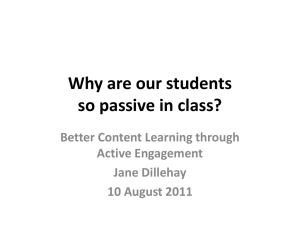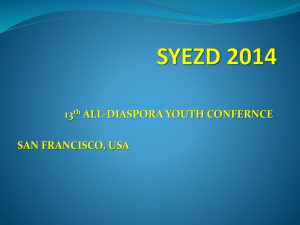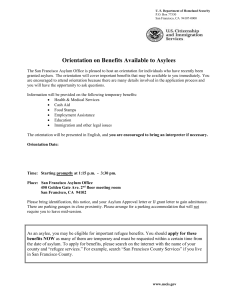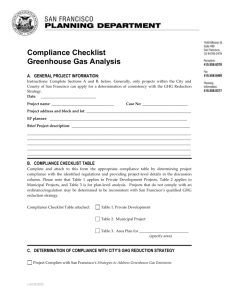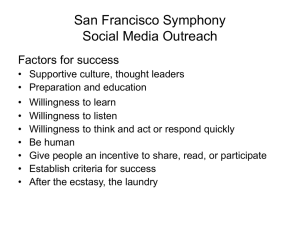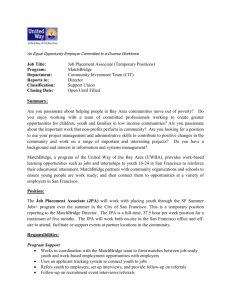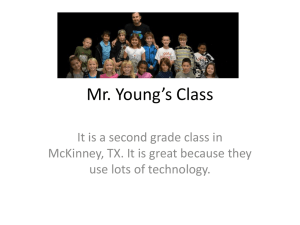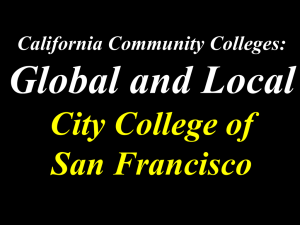Earplay 28/1
advertisement
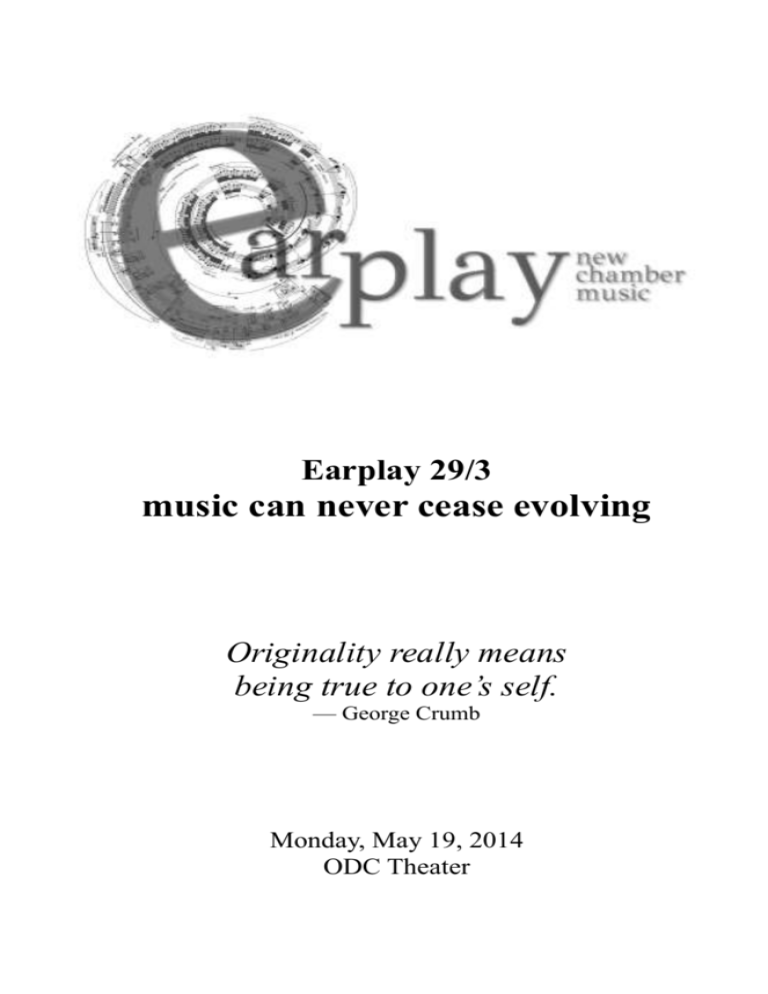
Earplay 29/3 music can never cease evolving Originality really means being true to one’s self. — George Crumb Monday, May 19, 2014 ODC Theater Welcome Welcome to the final concert of Earplay’s 2014 ODC season. We’re delighted to have composers Vera Ivanova, John MacCallum, and Reynold Tharp with us tonight. The program also includes a work by George Crumb, our featured composer for this season. We hope you will meet the composers at the preconcert discussion. After the concert, please join the composers, Earplayers, and board members at our post-concert reception in the lobby, where we’ll share our exciting plans for our upcoming 30th anniversary season. Tonight you will hear the winner of the 2013 Earplay Donald Aird Composers Competition, Vera Ivanova’s Three Studies in Uneven Meters. Our annual competition is open to composers of any age and nationality. We received entries from 25 countries and 25 US states this year, and we’ll perform the prize winner next season. Earplay wants to continue to present vibrant performances of great new music for another 29 years, but we need your help to make it happen. Please donate whatever you can at our website earplay.org: every dollar really helps! Enjoy tonight’s concert, and please join us again next season for more amazing music. Stephen Ness President, Earplay Board of Directors Board of Directors Staff Terrie Baune, musician representative Bruce Bennett, treasurer Mary Chun, conductor and artistic coordinator Richard Festinger May Luke, secretary R. Wood Massi, director of education Stephen Ness, president Laura Rosenberg Lori Zook, executive director Renona Brown, accountant Yunzhe Ma, intern Ian Thomas, sound recordist Advisory Board Chen Yi Richard Felciano William Kraft Kent Nagano Wayne Peterson Cover image: George Crumb, Makrokosmos, Vol. I, No. 2 Spiral Galaxy, Aquarius, p 19, Edition C. F. Peters, 1974. By kind permission of C. F. Peters Corp. 2 Monday, May 19, 2014 at 7:30 p.m. ODC Theater Earplay 29/3 originality really means being true to one’s self Earplayers Tod Brody, flutes Peter Josheff, clarinets Terrie Baune, violin Ellen Ruth Rose, viola Thalia Moore, cello Brenda Tom, piano Mary Chun, conductor Guest Artists Christy Dana, whistler John MacCallum, electronics Karen Rosenak, piano Pre-concert talk at 6:45 p.m.: Bruce Christian Bennett, moderator with Vera Ivanova, John MacCallum, and Reynold Tharp Please power down your cellphone before the performance (do not just silence it!). No photography, videography, or sound recording is permitted. Programs are subject to change without notice. Earplay’s season is made possible through generous funding from the Aaron Copland Fund for Music, the Alice M. Ditson Fund of Columbia University, the Ann and Gordon Getty Foundation, the William and Flora Hewlett Foundation, the San Francisco Foundation Fund for Artists, San Francisco Grants for the Arts, the Thomas J. White and Leslie Scalapino Fund of the Ayco Foundation, the Zellerbach Family Foundation, and generous donors like you. 3 Program John MacCallum Hyphos (2014) Tod Brody Peter Josheff Ellen Ruth Rose John MacCallum World premiere / Earplay commission George Crumb Eleven Echoes of Autumn, 1965 (1966) Tod Brody Peter Josheff Terrie Baune Karen Rosenak Christy Dana INTERMISSION Vera Ivanova Three Studies in Uneven Meters (2011) 1. BartoKagel 2. Canon à la Piazzolla 3. Scriabinesque Brenda Tom 2013 Earplay Donald Aird Composers Competition winner Reynold Tharp Piano Trio (2014) Terrie Baune Thalia Moore Karen Rosenak World premiere / Earplay commission 4 Program Notes Hyphos (2014) by John MacCallum for alto flute, bass clarinet, viola, and electronics World premiere / Earplay commission Text means Tissue; but whereas hitherto we have always taken this tissue as a product, a ready-made veil, behind which lies, more or less hidden, meaning (truth), we are now emphasizing, in the tissue, the generative idea that the text is made, is worked out in a perpetual interweaving; lost in this tissue—this texture—the subject unmakes himself, like a spider dissolving in the constructive secretions of its web. Were we fond of neologisms, we might define the theory of the text as an hyphology (hyphos is the tissue and the spider’s web). —Roland Barthes, The Pleasure of the Text Hyphos is a texture, a textile, consisting of many threads of time woven together in a counterpoint of continuously fluctuating tempos. Although the musicians begin together, they quickly diverge from the tempo they share. This tempo, however, remains latent throughout the piece, becoming manifest for brief and fleeting moments when the threads of the different musical parts intertwine in just the right way to reveal its rhythms. The musicians may choose to use clicktracks to help them remain situated in time with respect to the other performers and computer, however, the piece may also be played without the aid of click-tracks. In the latter case, the way in which the various musical threads become entangled is, to a certain extent, variable and the resulting web gradually unmakes its creator. This work makes use of new software developed by the composer at the Center for New Music and Audio Technologies (CNMAT) at UC Berkeley. This software builds on previous work by Matthew Wright as well as numerous 5 others and has been used extensively in recent works by Edmund Campion including Auditory Fiction, Small Wonder, and The Last Internal Combustion Engine. — J. MacC. Composer John MacCallum is based in Oakland, CA. From 2008–2011, he held a position as Musical Applications Programmer at the Center for New Music and Audio Technologies (CNMAT). While there, he designed a number of software tools, including one useful for composing and performing music with multiple, independent, smoothly varying tempos. This work resulted in his composition Aberration (2010) for percussion trio, the recording of which was supported by a grant from the American Composer’s Forum, and The Delicate Texture of Time (2012-13) for eight players, commissioned by the Eco Ensemble with a grant from the Mellon Foundation. In addition to his interest in polytemporal music, MacCallum’s compositional work is heavily reliant on technology both as a compositional tool and as an integral aspect of the performance of a piece. His works often employ carefully constrained algorithms that are allowed to evolve differently and yet predictably each time they are performed. MacCallum holds degrees from the University of California, Berkeley (Ph.D. in Music Composition), McGill University (M.M. in Composition), and the University of the Pacific (B.M. in Composition/Theory). In 2007, while working on his doctorate, John was awarded a FACE (French American Cultural Exchange) Fellowship to work at the Centre International de Récherche Musicale (CIRM) and to study composition and electronic music with Michel Pascal at the Conservatoire de Nice and the Université de Nice Sophia Antipolis. 6 Eleven Echoes of Autumn, 1965 (1966) by George Crumb for violin, alto flute, clarinet, and piano Eleven Echoes of Autumn, 1965 was composed during the spring of 1966 for the Aeolian Chamber Players (on commission from Bowdoin College). The eleven pieces constituting the work are performed without interruption: Eco 1. Fantastico Eco 2. Languidamente, quasi lontano ("hauntingly") Eco 3. Prestissimo Eco 4. Con bravura Eco 5. Cadenza I (for Alto Flute) Eco 6. Cadenza II (for Violin) Eco 7. Cadenza III (for Clarinet) Eco 8. Feroce, violento Eco 9. Serenamente, quasi lontano ("hauntingly") Eco 10. Senza misura ("gently undulating") Eco 11. Adagio ("like a prayer") Each of the echi exploits certain timbral possibilities of the instruments. For example, eco 1 (for piano alone) is based entirely on the 5th partial harmonic, eco 2 on violin harmonics in combination with 7th partial harmonics produced on the piano (by drawing a piece of hard rubber along the strings). A delicate aura of sympathetic vibrations emerges in echi 3 and 4, produced in the latter case by alto flute and clarinet playing into the piano strings. At the conclusion of the work the violinist achieves a mournful, fragile timbre by playing with the bow hair completely slack. The most important generative element of Eleven Echoes is the "bell motif" – a quintuplet figure based on the whole-tone interval – which is heard at the beginning of the work. This diatonic figure appears in a variety of rhythmic guises, and frequently in a highly chromatic context. Each of the eleven pieces has its own expressive character, at times overlaid by quasi-obbligato music of contrasting character, 7 e.g., the "wind music" of the alto flute and clarinet in eco 2 or the "distant mandolin music" of the violin in eco 3. The larger expressive curve of the work is arch-like: a gradual growth of intensity to a climactic point (eco 8) followed by a gradual collapse. Although Eleven Echoes has certain programmatic implications for the composer, it is enough for the listener to infer the significance of the motto-quote from Federico Garcia Lorca: "... y los arcos rotos donde sufre eI tiempo" ("... and the broken arches where time suffers"). These words are softly intoned as a preface to each of the three cadenzas (echi 5-7) and the image "broken arches" is represented visually in the notation of the music which underlies the cadenzas. — G. C. The mysterious and introverted works of George Crumb have achieved worldwide distribution and acclaim shared by few composers. He was born in 1929 in West Virginia, where the sounds of the hills created a kind of auditory memory that came to influence his music. “An echoing quality, or an interest in very long sounds, haunting sounds, sounds that don't want to die; this is all part of an inherited acoustic.” [GC] Crumb’s father, like his grandparents, was a professional musician and music copyist in the small city where they lived; his mother was a cellist. While still a young man, George followed his father’s path as a free-lance musician. Perhaps the fact that his work involved copying music as his father had is significant given the later development of Crumb’s unusually beautiful scores. In college he studied closely with Ross Lee Finney, and eventually received his doctorate at the University of Michigan. Crumb has pursued a long career as a music professor, mostly at the University of Pennsylvania. He has received many honors, including the Pulitzer Prize and a Grammy. He credits a diverse array of composers, including Mahler, Debussy, Ives, Bartok, Varese, and Webern, with influencing his work. Other major 8 influences have been medieval music and philosophy, cosmic contemplations, numerology, and humanism. Crumb’s music incorporates programmatic, symbolic, mystical, and theatrical elements, as well as sophisticated musical allusions. He has often used the poetry of Garcia Lorca. His scores have contained musical staves shaped like a peace sign and a spiral, direct quotations of the music of other composers, and a use of poetic instructional language that is also crystal clear. Perhaps the most central element of his approach has been a haunting exploitation of sound color, extending the traditional palette while emphasizing texture, timbre, and line. His works sometimes use extended techniques to evoke a wild surreal soundscape, but more often their quiet dynamics and resonant, slow sounds engender a feeling of sublimity. Demanding virtuosity from the performers, he encourages the display of their musical personalities. In recent years, Crumb has explored American folk songs with a series of seven American Songbooks, many inspired by and dedicated to his daughter, Ann Crumb, a Grammy-winning Broadway performer. — R. W. M. Three Studies in Uneven Meters (2011) by Vera Ivanova 1. BartoKagel 2. Canon à la Piazzolla 3. Scriabinesque for solo piano 2013 Earplay Donald Aird Composers Competition winner Vera Ivanova's Three Studies in Uneven Meters were composed in the Spring of 2011. This set of etudes is dedicated to several 20th-century composers, who influenced her music in the past and whose compositional techniques are referenced in these three pieces. 9 The first study (BartoKagel, and a little bit of Stravinsky) joins together personalities of three composers: Béla Bartók, Mauricio Kagel, and Igor Stravinsky. All three composers were influenced by Eastern European and Russian folk music and, in their own turn, influenced each other's music (Stravinsky influenced Bartók, and Bartók influenced Kagel). Second in this set is Canon à la Piazzolla, descending canon with all voices sustained. The theme of this canon is in the time signature of 5/16 and is reminiscent of some irregularities in the rhythmic pattern of a tango. The canon builds up as the voices are added and sustained, creating an accumulative effect that destroys the originally recognizable melodic motif. The last study (Scriabinesque, fleeting cycles) explores the harmonic world of Alexander Scriabin, restricted to its own rules of horizontal and vertical sonorities. Even though this study does not reproduce Scriabin's harmonies, it makes use of interval "cycles" (chain of repeated intervals of the same type). Due to the sameness of interval cycles, the harmonic and vertical sonorities in this piece are locked (or "fixed") and thus reference some of Scriabin's etudes. – V. I. Vera Ivanova graduated from the Moscow Conservatory (Honours Diploma), Guildhall School of Music and Drama in London (MM with distinction), and the Eastman School of Music (Ph.D. in Composition). Her works have been performed in Russia, Europe, and the U.S.A. After teaching as Assistant Professor of Theory and Composition at the Setnor School of Music of Syracuse University (NY), she was appointed as Assistant Professor of Music in the College of Performing 10 Arts at Chapman University (Orange, CA). Dr. Ivanova is a recipient of the Sproull Fellowship at Eastman, the Gwyn Ellis Bequest Scholarship at Guildhall School, Moscow Culture Committee and American Composers Forum Subito grants, Honourable mention at the 28th Bourges Electro-Acoustic Competition, 3rd Prize at the 8th International Mozart Competition, 1st Prize in Category "A" at International Contest of Acousmatic Compositions Métamorphoses 2004 (Belgium), the ASCAP Morton Gould Young Composers Award, the André Chevillion-Yvonne Bonnaud Composition Prize at the 8th International Piano Competition at Orléans (France), and the Special Award from Yvar Mikhashoff Trust for New Music. She is also a winner of the 2013 Athena Festival Chamber Competition and the 2013 Earplay Donald Aird Composers Competition. Her music is available in print from Universal Edition and Theodore Front Music Literature, Inc., SCI Journal of Music Scores (vol. 45), on CDs from Ablaze Records (Millennial Masters series, Vol. 2), Quartz Music, Ltd., PARMA Recordings (SCI CD series, No. 27), Musiques & Recherches (Métamorphoses 2004), Centaur Records (CRC 3056), and on her website at www.veraivanova.com. Piano Trio (2014) by Reynold Tharp for violin, cello, and piano World premiere / Earplay commission My Piano Trio was written from December 2013 to March 2014 for Earplay. As in several other recent pieces of mine, the overall shape and flow of the piece is hopefully clearly articulated within a continuous single movement. Unlike my other music, however, which typically bears programmatic or poetic titles, in this instance I fell back on a 11 simple generic title. Nevertheless, the trio still relies on the narrative and dramatic impulses that drive all my music, and evocative or atmospheric qualities (to me, at least) are hardly absent. In particular, I imagined the slowly changing scales of the opening, with their uneasy rhythmic fluidity, as the slow surging of ocean tides. These waves return in different incarnations across the thirteen-minute span of the piece, and are also gradually transformed into contrasting ideas -- one faster and more rhythmically driven, one playful with its bouncing echoes, and a last one more darkly lyrical. — R. T. The music of Reynold Tharp has recently been described as “tone painting at its most adroit” evoked with “a prismatic palette” (Financial Times), and “gorgeous…a sensuous evocation of colors and atmospheres…. Not content to write textures that are merely interesting or surprising, Tharp concocts sounds that are also ravishing and intoxicating” (San Francisco Classical Voice). The New York Times called a recent piece “a winner” and added, “Elegant, airy and weightless figurations for an octet of strings, winds, brasses, piano and percussion were a stylish and fitting homage to Ligeti. The music also made you eager to hear more from Mr. Tharp….” Tharp’s music has been performed in the U.S., Europe, and Asia by groups such as the New Juilliard Ensemble, San Francisco Contemporary Music Players, Minnesota Orchestra, Ensemble Dal Niente, Boston Modern Orchestra Project club concerts, Ensemble Diffraction, Orchestre Lyrique de Region AvignonProvence, and the Nieuw Ensemble. Recent highlights include the Korean premiere of his music at the Sejong Chamber Hall in Seoul and two new pieces, a large ensemble piece for the New Juilliard Ensemble and a commissioned work for organ. In 2012, Albany Records released a CD by the Aletheia Duo of music inspired by nature, which includes his piece Chaparral. 12 Tharp was born in Indiana and grew up in southern California. After early training as a pianist, he studied composition and history at Oberlin College and Conservatory and earned a Ph.D. in composition at the University of California, Berkeley, studying with Jorge Liderman, Richard Felciano, and Cindy Cox. As recipient of Berkeley’s Ladd Fellowship he spent two years in Paris studying composition with Philippe Leroux and orchestration with Marc-André Dalbavie. Currently assistant professor of composition and theory at the University of Illinois, he has previously taught at Northwestern University and San Francisco State University. Earplayers “… One cannot resist the charm, energy and allégresse that was displayed on the podium by Mary Chun.” — Le Figaro, Paris A fierce advocate of new work, Mary Chun (conductor) has worked with many composers such as John Adams, Olivier Messiaen, Libby Larsen, William Kraft, and Tan Dun, to name a few. At the invitation of composer John Adams, she conducted the Finnish chamber orchestra Avanti! in the Paris, Hamburg and Montreal premiere performances of his chamber opera Ceiling/Sky to critical acclaim. Passionate about new lyric collaborations, she has music-directed several world premieres including Libby Larsen’s most recent opera, Every Man Jack; Mexican-American composer Guillermo Galindo’s Decreation: Fight Cherries, a multi-media experimental portrait of the brief life of the brilliant French philosopher, Simone Weil; Carla Lucero’s Wuornos, the tragic true tale of the notorious female serial killer; and Joseph Graves’ and Mort Garson’s Revoco. Under her music direction, Earplay received a Bay Area Theater Critics Circle nomination for Earplay’s performances in the Aurora Theater production of Stravinsky’s Soldier’s Tale. Other conducting engagements include opera tours with the Kosice Opera throughout Germany, Switzerland and 13 Austria in addition to concerts in Belgium and the Czech Republic. She has also been invited to conduct at the Hawaii Opera Theater, the Lyric Opera of Cleveland, Opera Idaho, the Texas Shakespeare Festival, Ballet San Joaquin, West Bay Opera, Pacific Repertory Opera, Mendocino Music Festival, West Edge Opera and the Cinnabar Opera Theater where she is Resident Music Director. She makes her Chinese debut this spring as Music Director for the Seven Ages production of Avenue Q in Beijing at the Haidian Theater. In addition to being a member of Earplay, Terrie Baune (violin) is co-concertmaster of the Oakland-East Bay Symphony, concertmaster of the North State Symphony, and a former member of the Empyrean Ensemble. Her professional credits include concertmaster positions with the Women’s Philharmonic, Fresno Philharmonic, Santa Cruz County Symphony, and Rohnert Park Symphony. A member of the National Symphony Orchestra for four years, she also spent two years as a member of the Auckland Philharmonia Orchestra of New Zealand, where she toured and recorded for Radio New Zealand with the Gabrielli Trio and performed with the New Zealand Symphony Orchestra. Tod Brody (flutes) has enjoyed a long career as a musician, teacher, and administrator. As a flutist, Brody is well known to California audiences as a chamber musician and orchestra player, with a focus on contemporary music. As flutist with Earplay, Empyrean Ensemble, Eco Ensemble, and the San Francisco Contemporary Music Players, he has performed many world premieres, and has been extensively recorded. He is on the music faculty at the University of California, Davis, where he teaches flute and chamber music. In September, 2013, Brody was named the first executive director of San Francisco's Opera Parallèle, which is dedicated to developing and performing contemporary operas. 14 Peter Josheff (clarinets) is a founding member of Sonic Harvest and of Earplay. He is also a member of the San Francisco Contemporary Music Players, the Empyrean Ensemble, and the Eco Ensemble. He has performed with many other groups, including the Paul Dresher Ensemble, Melody of China, Composers Inc., and sf Sound, and has appeared as a clarinetist on numerous recordings, concert series and festivals, both nationally and internationally. His recent compositions include Europa & The Bull (2014), a chamber oratorio premiered by The Sonic Harvest Players at UC Santa Cruz in April 2014; The Cauldron: Six Poems by Carol Vanderveer Hamilton (2013), commissioned and premiered by tenor Brian Thorsett in January 2014; Waiting (2012), commissioned and premiered by Earplay in March 2013; Sutro Tower in the Fog (2011), commissioned, premiered and recorded by The Bernal Hill Players; Nautical Man Nautical Man (2011), an album of pop songs; Sextet (2010), Caught Between Two Worlds (2009), Inferno (2006-2008), and Viola and Mallets (2007). His work has been performed by Earplay, the Empyrean Ensemble, the Bernal Hill Players, the Laurel Ensemble, San Francisco Cabaret Opera, Sonic Harvest, and others. Peter has worked extensively with young composers. Through discussion and performance of their music he has brought his unique perspective as a composer’s clarinetist to graduate and undergraduate classes at UC Berkeley and Davis, Stanford University, San Francisco State University, and Sacramento State University, and for the American Composers Forum Composer in the Schools Program. His workshop, Clarinet for Composers, has been presented at the UC Davis Clarinet Festival and at an American Composers Forum seminar in San Francisco. 15 A native of Washington D.C., Thalia Moore (cello) began her cello studies with Robert Hofmekler, and after only 5 years of study appeared as soloist with the National Symphony Orchestra of Washington at the Kennedy Center Concert Hall. She attended the Juilliard School of Music as a student of Lynn Harrell. While at Juilliard, she was the recipient of the Naumberg Scholarship and won first prize in the National Arts and Letters String Competition. Ms. Moore has been Associate Principal Cellist of the San Francisco Opera Orchestra since 1982 and a member of the San Francisco Ballet Orchestra since 1989. She has appeared as soloist at Avery Fisher Hall (Lincoln Center), Carnegie Recital Hall, Kennedy Center Terrace Theater, Herbst Theater, and the San Francisco Legion of Honor. In 1999, she was named a Cowles Visiting Artist at Grinnell College, Iowa, and in 1999 and 2001 won election to the Board of Governors of the National Academy of Recording Arts and Sciences. Moore has been a member of the Empyrean ensemble since 1999 and has made recordings with the group of works by Davidovsky, Niederberger, Bauer, and Rakowski. As a member of Earplay, she has participated in numerous recordings and premieres, including the American premiere of Imai’s La Lutte Bleue for cello and electronics. Ellen Ruth Rose (viola) enjoys a varied career as a soloist, ensemble musician and teacher with a strong interest the music of our times. She is a member of Eco Ensemble, Empyrean Ensemble, and Earplay. She has worked extensively throughout Europe with Frankfurt’s Ensemble Modern and the Cologne experimental ensembles Musik Fabrik and Thürmchen Ensemble and has performed as soloist with the West German Radio Chorus, Empyrean Ensemble, Earplay, Thürmchen Ensemble, the San Francisco Contemporary Music Players, Santa Cruz New Music Works, at the San Francisco Other Minds and Ojai Music festivals, and at Monday Evening Concerts in Los Angeles. She has appeared on numerous recordings, including a CD of the 16 chamber music of German composer Caspar Johannes Walter — featuring several pieces written for her — which won the German Recording Critics new music prize in 1998. Over the past several years she has collaborated with and premiered works by numerous Northern California composers, including Kurt Rohde, Edmund Campion, Aaron Einbond, John MacCallum, Mauricio Rodriguez, Cindy Cox, Mei-Fang Lin, Robert Coburn, and Linda Bouchard. In 2003 she created, organized and directed Violafest!, a four-concert festival at UC Davis celebrating the viola in solos and chamber music new and old, including premieres of pieces by Yu-Hui Chang and Laurie San Martin. Rose holds an M.Mus. in viola performance from the Juilliard School, an artist diploma from the Northwest German Music Academy in Detmold, Germany and a B.A. with honors in English and American history and literature from Harvard University. Her viola teachers have included Heidi Castleman, Nobuko Imai, Marcus Thompson, and Karen Tuttle. She is on the instrumental faculty at UC Davis and UC Berkeley and has taught at the University of the Pacific, the Humboldt Chamber Music Workshop, and the Sequoia Chamber Music Workshop. Brenda Tom (piano) has performed as a soloist with the SF Chamber Orchestra, the California Symphony, the Pittsburgh Ballet Orchestra, I Solisti di Oakland, the Sacramento Symphony, the Fort Collins Symphony, the Diablo Symphony, the Sacramento Ballet Orchestra, and the San Francisco Ballet Orchestra. She has recorded with PianoDisc, China Recording Company, Klavier Records, V’tae Records, and IMG Media. She has served as principal pianist with the Sacramento Symphony, Symphony of Silicon Valley, San Jose Chamber Orchestra, Monterey Symphony, and Santa Cruz Symphony, and has performed with the Sacramento Chamber Music Association, MusicNow, Chamber Music/West, the Cabrillo Festival, the Festival of New American Music, Music From Bear Valley, and the Hidden Valley Music Festival. Ms. Tom graduated from the San Francisco Conservatory of Music, where she studied 17 with Beatrice Beauregard and Mack McCray. Guest Artists Christy Dana (whistler) has whistled at the finals of the 2013 International Whistling Convention, on the faculty concert of the San Francisco Early Music Recorder Workshop, and at Yoshi’s with the Montclair Women’s Big Band. She can also be heard whistling on the video game The Sims 3 and on her jazz CD Merry-GoRound. Holding M.M. and D.M degrees in Music Theory and Brass from Indiana University, she teaches musicianship and jazz theory and performance at UC Berkeley, and has been active in the Bay Area music scene as a trumpeter in jazz, orchestral, and early music. Karen Rosenak (piano) is an “almost native” of the Bay Area. She was a founding member/pianist of Bay Area new-music groups Earplay and the Empyrean Ensemble. She studied modern piano with Carlo Bussotti and Nathan Schwartz, and credits Margaret Fabrizio with introducing her to the fortepiano during her graduate work in early music at Stanford University. She has found the balance between old and new music, and between old and new pianos, to be an ongoing, most satisfying pursuit. Since 1990, she has been on the faculty at U.C. Berkeley, where she teaches musicianship and contemporary chamber music. Special Thanks Bruce Christian Bennett Berkeley Arts Festival CNMAT [UCB Center for New Music and Audio Technologies] Kitty Brody 18 George Crumb Carla Lucero / Acad. of Art Univ. John MacCallum Yunzhe Ma Muriel Maffre / SF MP+D ODC Theater C. F. Peters Corporation Ellen Ruth Rose Karen Rosenak George Crumb: Eleven Echoes of Autumn, 1965, Eco 5 and Cadenza I, p. 6, C. F. Peters, 1972. By kind permission of C. F. Peters Corp. Join us Send email to earplay@earplay.org to join our mailing list. And please consider supporting the cause of new music with a generous donation! Mail your tax-deductible check to: Earplay 560 29th Street San Francisco, CA 94131-2239 or click on the Donate button at earplay.org to donate via PayPal. Earplay is a 501(c)(3) nonprofit organization. 19 20 Staff With nearly 30 years of administration experience, Lori Zook (executive director) has worked with non-profit arts organizations since 1991, and has held management level positions – with an emphasis on fundraising – since 1998. Most recently, she was a Development Manager at Quinn Associates, a firm serving small to mid-sized non-profit organizations throughout the Bay Area, where she assisted multiple clients with grant writing, grants management, prospect research, and strategic planning. While there, she raised millions of dollars for her clients, which included presenters, music ensembles, dance companies, arts education providers, and complex public-private partnership organizations. She served as the executive director of Oakland Opera Theater from 1998-2005, and during her tenure, the company expanded its season, developed an administrative infrastructure, experienced substantial audience growth, and successfully began fundraising. She also co-founded the company's venue, the Oakland Metro in 2001. Lori served on the City of Oakland’s Cultural Affairs Commission from May 2006 through June 2010, and was Acting-Chair of that body from June 2007 through October 2009. Under her leadership, the commission became participants in the Oakland Partnership and the East Bay Cultural Corridor project, the latter involving a fourcity partnership to develop marketing strategies. She has served on arts funding panels for the City of Oakland and the Arts Council of Silicon Valley, and has been involved in several arts initiatives, including ArtVote, Spokes of a Hub, and the Illuminated Corridor. Ian D. Thomas (sound recordist) is a native of San Francisco. He currently works in film as a sound designer and composer. His website is iandthomas.com. 21 Links Earplay Earplay archives Earplay tickets ODC SF Comm. Music Center SF Museum of Perf.+Design George Crumb Vera Ivanova John MacCallum Reynold Tharp earplay.org earplay.org/archives www.odcdance.org/buytickets odcdance.org sfcmc.org mpdsf.org www.georgecrumb.net www.veraivanova.com john-maccallum.com www.music.illinois.edu/faculty/reynold-tharp Donors Earplay sincerely thanks its donors for their generosity and for their continued belief in the importance of the creation and performance of intriguing new music. Please join us by giving whatever you can to support our cause, we can’t do it without you! $10,000 + William & Flora Hewlett Foundation San Francisco Grants for the Arts $5,000 + The Ann and Gordon Getty Foundation $1,000 + The Aaron Copland Fund for Music The Alice M. Ditson Fund of Columbia University Richard Festinger May Luke Bari & Stephen Ness Laura Rosenberg in honor of Lori Zook Larry Russo The San Francisco Foundation The Thomas J. White & Leslie Scalapino Fund for the AYCO Foundation The Zellerbach Family Foundation $500 + Jane Bernstein & Robert Ellis Mary Chun Raymond Chun 22 $100 + Mark Applebaum Herbert Bielawa Norman Bookstein Elizabeth A. and William B. Carlin Patti Deuter Ellinor Hagedorn Sally Kipper Antoinette Kuhry & Thomas Haeuser Susan Kwock David Pereira Wayne Peterson Dr. Arthur & Joan Rose in honor of Ellen Rose William Schottstaedt Olly & Elouise Wilson Other generous donors: Katherine Brody Ann Calloway Dr. Stuart M. Gold Ellen Ruth Harrison Florence Neuhoff Wendy Niles Sandra and Leonard Rosenberg William Specht Kim Stokoe ODC Theater ODC Theater staff: Director Christy Bolingbroke Programming & Operations Manager Jeffrey Morris Production Manager David Coffman Marketing Team Francis Aviani, Julia Snippen, Jerri Zhang House Technicians Jason Dinneen, Mark Hueske, Eric Iverson, Zoe Klein, Matt Lewis, Delayne Medoff, Becky Robinson-Leviton, Ernie Trevino Client and Patron Services Manager Dan Rivard Box Office Agents Diana Broker, Leah Gardner, Joseph Hernandez, Sarah Pomarico House Managers Michelle Fletcher, Michelle Kinny, Mary Lachman, Christi Welter, Alec White, Karla Quintero Receptionists Brittany Delany, Zachary Sharrin Mission and impact: ODC Theater exists to empower and develop innovative artists. It participates in the creation of new works through commissioning, presenting, mentorship and space access; it develops informed, engaged and committed audiences; and advocates for the performing arts as an essential component to the economic and cultural development of our community. The Theater is the site of over 150 performances a year involving nearly 1,000 local, regional, national and international artists. Since 1976, ODC Theater has been the mobilizing force behind countless San Francisco artists and the foothold for national and international touring artists seeking debut in the Bay Area. Our Theater, founded by Brenda Way, then under the leadership of Rob Bailis for nearly a decade, and currently under the direction of Christy Bolingbroke, has earned its place as a cultural incubator by dedicating itself to creative change-makers, those leaders who give our region its unmistakable definition and flare. Nationally known artists Spaulding Gray, Diamanda Galas, Molissa Fenley, Bill T. Jones, Eiko & Koma, Ronald K. Brown/EVIDENCE, Ban Rarra and Karole Armitage are among those whose first San Francisco appearance occurred at ODC Theater. ODC Theater is part of a two-building campus dedicated to supporting every stage of the artistic lifecycle - conceptualization, creation, and performance. This includes our flagship company – ODC Dance – and our School, in partnership with Rhythm and Motion Dance Workout down the street at 351 Shotwell. Over 250 classes are offered weekly and your first adult class is $5. For more information on ODC Theater and all its programs, please visit www.odctheater.org. Support: ODC Theater is supported in part by the following foundations and agencies: Creative Work Fund, The Wallace Alexander Gerbode Foundation, Grants for the Arts/San Francisco Hotel Tax Fund, James Irvine Foundation, LEF Foundation, National Dance Project, National Endowment for the Arts, San Francisco Foundation, San Francisco Arts Commission, Walter & Elise Haas Fund, William & Flora Hewlett Foundation, the Zellerbach Family Foundation and The Fleishhacker Foundation. ODC Theater is a proud member of Association of Performing Arts Presenters, Chamber Music America, Dance USA, Dancer’s Group, and Theater Bay Area. 23 About Earplay Mission statement: play nurtures new chamber music, linking audiences, performers, and composers through concerts, commissions, and recordings of the finest music of our time. Founded in 1985 by a consortium of composers and musicians, Earplay is dedicated to the performance of new chamber music. Earplay offers audiences a unique opportunity to hear eloquent, vivid performances of some of today’s finest chamber music. Earplay has performed over 400 works by more than 275 composers in its 29-year history, including over 100 world premieres and more than 60 new works commissioned by the ensemble. This season will reinforce Earplay’s unwavering track record of presenting exceptional music in the 21st century. Concerts feature the Earplayers, a group of artists who have developed a lyrical and ferocious style. Mary Chun conducts the Earplayers, all outstanding Bay Area musicians: Tod Brody, flute and piccolo; Peter Josheff, clarinet and bass clarinet; Terrie Baune, violin; Ellen Ruth Rose, viola; Thalia Moore, cello; and Brenda Tom, piano. Individual donations are vital to Earplay’s success, and we greatly appreciate your generosity! Visit our website earplay.org to make a tax-deductible donation, or make a donation tonight. Together we can keep the music coming! Earplay 560 29th Street San Francisco, CA 94131-2239 Email: earplay@earplay.org Web: earplay.org Earplay New Chamber Music @EarplayinSF 24 Earplay’s 2014 Season in San Francisco: music can never cease evolving ODC Theater at 7:30 p.m. Pre-concert talk at 6:45 p.m. 3153 17th Street (at Shotwell), San Francisco Tickets: 415.863.9834 or www.odcdance.org/buytickets Earplay 29/1 Monday, February 10, 2014 music begins where poetry leaves off Tamar Diesendruck: On That Day George Crumb: Sonata for Solo Cello Dan Reiter: Sonata for Flute and Harp David Schiff: Joycesketch II Ann Callaway: Memory Palace Earplay 29/2 Monday, March 31, 2014 rhythm most directly affects our central nervous system George Crumb: Four Nocturnes (Night Music II) Nick Omiccioli: falling through infinity Mark Winges: Local Colloquies * † Jean Ahn: ADGC Howard Hersh: Full Court Press Earplay 29/3 Monday, May 19, 2014 originality means being true to one’s self John MacCallum: Hyphos * † George Crumb: Eleven Echoes of Autumn, 1965 Vera Ivanova: Three Studies in Uneven Meters †† Reynold Tharp: Piano Trio * † * World premiere † Earplay commission †† 2013 Aird prize Earplay 560 29th Street San Francisco, CA 94131 Email: earplay@earplay.org Web: earplay.org 25
